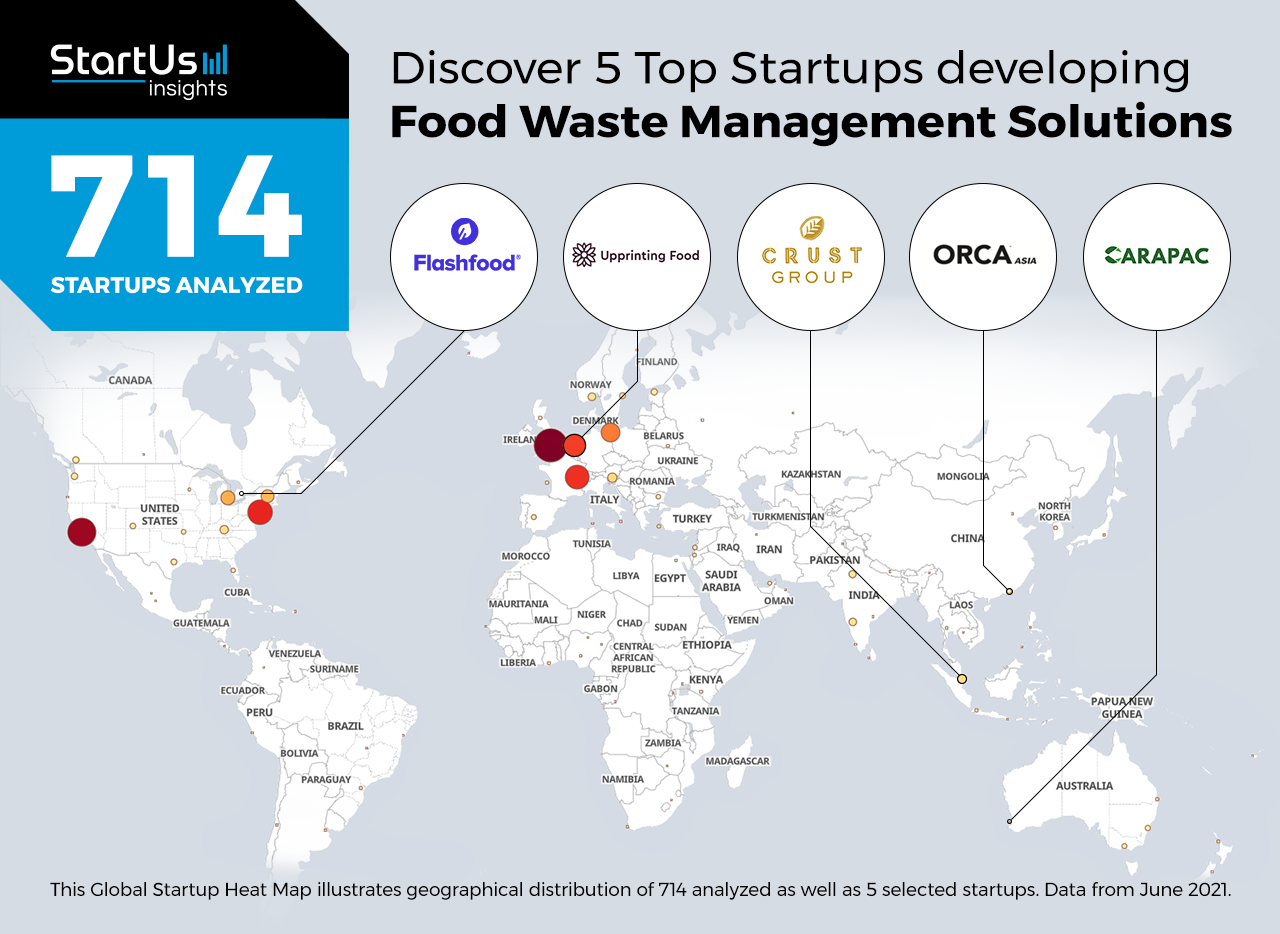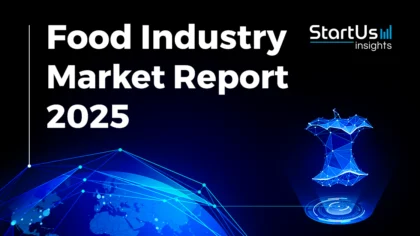Staying ahead of the technology curve means strengthening your competitive advantage. That is why we give you data-driven innovation insights into the food industry. This time, you get to discover 5 hand-picked startups developing food waste management solutions.
Global Startup Heat Map highlights 5 Top Food Waste Management Solutions out of 714
The insights of this data-driven analysis are derived from the Big Data & Artificial Intelligence-powered StartUs Insights Discovery Platform, covering 2.093.000+ startups & scaleups globally. The platform gives you an exhaustive overview of emerging technologies & relevant startups within a specific field in just a few clicks.
The Global Startup Heat Map below reveals the distribution of the 714 exemplary startups & scaleups we analyzed for this research. Further, it highlights 5 food startups that we hand-picked based on criteria such as founding year, location, funding raised, and more. You get to explore the solutions of these 5 startups & scaleups in this report. For insights on the other 709 food waste management solutions, get in touch.
ORCA Asia works on Food Waste Recycling
An immense part of produced food is wasted due to improper food management and poor ingredient quality at restaurants, grocery shops, and other food outlets. Therefore, it is critical for restaurants and food brands to control their inventory for minimal food wastage, to reduce their expenses, and increase sustainability. To this end, startups develop food waste management and disposal solutions to support food providers. This way, restaurants are able to streamline their production process, decrease food waste as well as establish independent food disposal systems.
ORCA Asia is a Hong Kong-based startup that offers food waste recycling solutions. The startup’s food digester, ORCA, uses aerobic microorganisms to break down food waste into sustainable discharge. This effluent is disposable through existing plumbing infrastructure, enabling restaurants and commercial kitchens to cut costs in food waste hauling and janitorial supply costs. Plus, ORCA also tracks the food waste and generates personalized dashboards to analyze real-time data through the ORCA Portal in order to take action against food waste. ORCA is available in 4 different models based on food waste capacity and spatial specs.
CRUST Group upcycles Unsold Bread into Beer
Food retailers incur massive losses due to food items nearing lower shelf life staying unsold. Such food products are forwarded to landfills, generating carbon dioxide emissions. To tackle this issue, some startups promptly collect surplus food items and upcycles them into high-value products. Additionally, other startups create purees using surplus food items for 3D food printing, minimizing food waste and carbon footprint.
CRUST Group is a Singaporean startup that upcycles surplus ingredients like bread and fruit peels into beers and sparkling water. The startup partners with food services and retailers to divert surplus food items from landfills. This, in turn, allows the food industry to significantly reduce its carbon footprint while delivering high-value products.
Flashfood connects Customers with Surplus Food
Fresh and processed foods that have passed the ‘best before’ date at grocery stores and food outlets are integral components of food waste reaching landfills. Therefore, startups devise solutions to minimize food waste at restaurants and grocery stores using technologies such as real-time food condition monitoring and data analytics. This enables food brands to closely track food conditions and use the data to streamline food supply chain management, thereby also reducing operational costs.
Canadian startup Flashfood develops the Flashfood smartphone app to connect customers with surplus food at grocery stores. The startup’s app allows grocers to recover costs and significantly reduce carbon footprint by selling products that reached best before dates. Also, consumers are able to buy food items like produce, meat, and prepared meals at discounted prices. In effect, Flashfood’s solution diverts potential food waste by redistributing it to customers looking for more sustainable options.
Upprinting Food converts Food Waste into 3D-Printed Food
When it comes to food waste, partially rotten food items are tagged non-edible and sent to landfills. However, recovering partially edible food items allows food manufacturers to reduce food expenses as well as reduce their carbon footprint. But segregating residual edible food items is a tedious task. That is why startups utilize computer vision combined with food grading to analyze food conditions before disposing of them. This way, food manufacturers gain insights into food’s actual condition and optimize their operations.
Upprinting Food is a Dutch startup that develops food using residual food flows. The startup creates customized recipes with 3D-food printing using purees from the residual food. This way, Upprinting Food reduces food waste from restaurants and other food outlets as well as upcycles the remaining waste into customized food choices. The startup’s solution allows food producers to effectively reduce costs in food procurement and further provides customized dishes such as sweet banana rice and crunchy carrots.
Carapac repurposes Crustacean Shell into Plastic Alternatives
Food waste constitutes a tremendous amount of byproducts from food manufacturing. Accordingly, startups develop food waste tracking and food waste reduction solutions to optimize food manufacturing and ensure minimal wastage during the production process. Further, there are solutions that particularly tackle food byproducts, which are usually nutrient-rich, and upcycle them. Such solutions reduce the amount of food waste that reaches landfills and generate an income source while reducing operational costs for food developers.
Australian startup Carapac makes sustainable soft plastic alternatives from crustacean shell waste. The startup’s biodegradable packaging material from chitosan fully breaks down within 90 days, enabling a negative waste approach for food businesses. Plus, the startup’s crustacean-based material has antifungal and antibacterial properties, extending product shelf life. Carapac’s solutions help food producers steer towards sustainability and improve the usability of food products.
Discover more Food Startups
Food startups such as the examples highlighted in this report focus on alternative proteins, 3D printing, personalized nutrition as well as robotics. While all of these technologies play a major role in advancing the food industry, they only represent the tip of the iceberg. To explore more food technologies, simply get in touch to let us look into your areas of interest. For a more general overview, you can download our free Food Innovation Report to save your time and improve strategic decision-making.


![Food and Beverage Industry: Top 10 Technology Trends [2025 & Beyond]](https://www.startus-insights.com/wp-content/uploads/2024/11/Food-and-Beverage-Industry-Trends-SharedImg-StartUs-Insights-noresize-420x236.webp)






